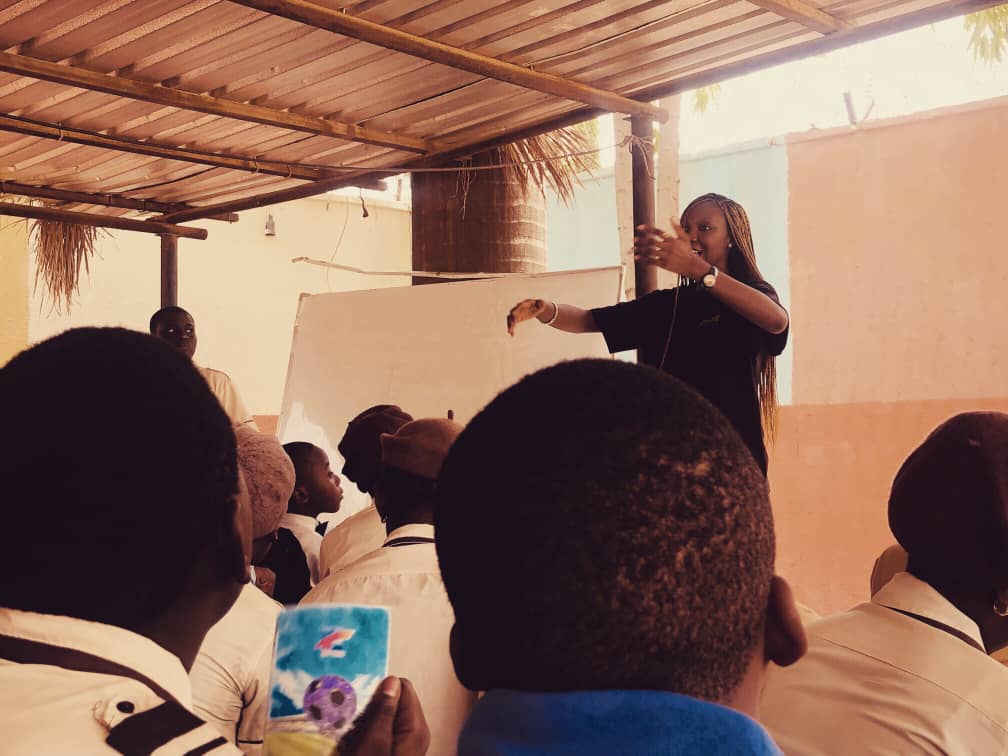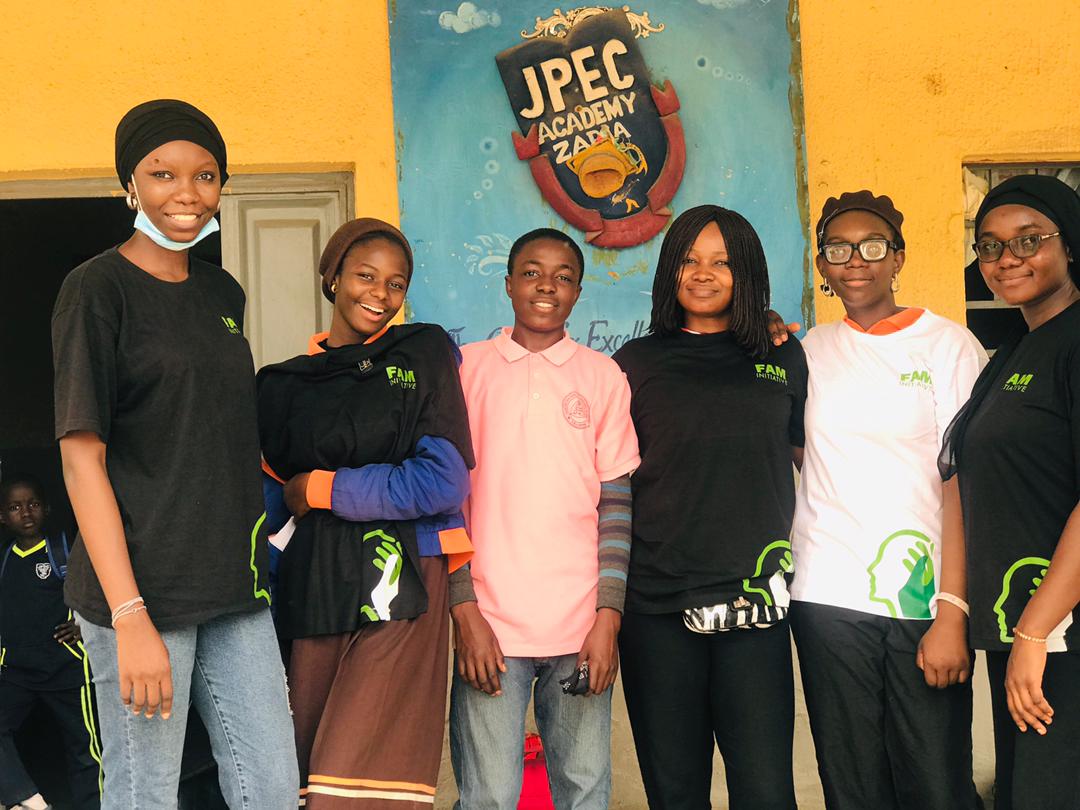The eldest of six siblings, Jecinta Egbim embraced a diverse range of interests during her formative years. To stimulate her creativity, she read psychological crime thrillers, practiced cooking and took evening strolls around the dusty streets of Kaduna in northern Nigeria.
Egbim’s childhood was filled with a healthy dose of love and discipline until a sour incident at age 6 left her frightened and isolated for years. Her self esteem promptly took a hit, and she slowly withdrew from society.
‘It messed with my whole social life. I grew up constantly questioning if people valued me for anything beyond my looks,” she recalled.
This feeling would persist until 2018, when she met a friend known as Abdulmuiz Idris, whose support brought a sense of understanding and healing to her grief. A year later, as a student in Chemistry at the Ahmadu Bello University in Zaria, Egbim was selected for a panel on student well-being.
“That’s where I met Professor Taiwo Sheikh Abdullateef and Dr. Aisha Abdullateef,” Egbim said. “They became my mentors, and Professor Abdullateef even became my therapist. It was a turning point in my life.”
Prior to the encounter, Egbim didn’t have a clue about how much the trauma had affected her. Yet Egbim is hardly an isolated example. Statistics have shown that millions of Nigerians grapple with mental health challenges, with approximately 20% of the population experiencing conditions such as depression, anxiety, and substance abuse. These conditions exert a knock-on effect on families and wider society.
Bridging the gap
Egbim found healing after therapy sessions with Professor Abdullateef, which left her with a burning desire to help others and spurred her into starting the Friends Advocacy for Mental Health Initiative, or FAM Initiative, in October 2020.
As a youth-led nonprofit, FAM Initiative strives to spread awareness of mental health and its services to rural communities and schools. Driven by the need for holistic mental health advocacy for adolescents, Egbim and her team launched the Adolescents Safe Haven club project in secondary schools across communities in Northwestern Nigerian.
“Our Adolescents Safe Haven Club was born out of the need to offer preventive care in Secondary schools. It wasn’t hard picking beneficiaries as at the time we started because we were focused on adolescents within the Zaria metropolis,” Egbim explained.
Through monthly school sessions, the initiative takes students on a self-awareness journey, educating them about mental health topics, debunking myths about the diseases, exposing them to quality mental health first aid, and discussing coping mechanisms for managing emotional and mental stress.
More often than not, the sessions are designed to help the students build resilience against anxiety, stress, and depression. Beyond awareness, the project has equipped over 300 adolescents with actionable steps to improve their mental well-being at any time.
FAM Initiative also supports schools’ staff and management in strengthening their commitment to fostering healthy lifestyles for students. This extends beyond the individual, to benefit families, communities, and Nigeria’s development.
Today, the project’s impact is evident in improved academic performance of the students, behavioral changes in and out of school, and a greater willingness to seek help.
“We have seen introverted students battling depression receive care, children with low self-esteem gain confidence, and many more positive transformations,” Egbim shared.
Success stories
Peculiar Samuel wasn’t always confident. As a teenager, she struggled with depression and confusion, finding solace only in music. This soon changed when Samuel joined the Adolescent Safe Haven club at Jpec Chimel Academy in Zaria. Through a safe space, Samuel and several other students were introduced to the concept of mental health and self-discovery.
“It was like a surprise to me when I found out about the importance of mental health in our daily lives. We attended sessions every Thursday and were engaged with assignments to research more about mental illnesses. We also played games and had round table discussions,” she said.
Samuel’s dedication didn’t go unnoticed. She was elected President of the Adolescent Safe Haven Club at the Jpec Chimel Academy Zaria, a role that came with both challenges and immense gratification. The responsibility to empower others with this newfound knowledge fueled her passion.

Now 18, Samuel is a law student at Ahmadu Bello University Zaria, while her legacy at Jpec Chimel Academy continues to thrive. Occasionally, she visits the school to monitor the overall impacts of the club.
“Even today, I am still exploring what makes me sad, frustrated, and depressed while figuring out my coping mechanisms. I always ask the juniors whenever I visit my old school what they learn about their mental health, and it’s so encouraging to know that things are improving.”
Since joining the Adolescent Safe Haven Club, Umar Faruq Muhammad has undergone a transformation. The 19-year-old SS3 student at Jpec Chimel Academy, Zaria, has learned to manage his anger and navigate emotions effectively when interacting with his peers. The club sessions have also equipped him with communication skills to shape his conversations with elders.
“The club helps us to differentiate right and wrong. It also teaches us how to be honest and helpful to others,” Muhammad said.
Across Nigeria, initiatives like a medical student raising awareness among teenagers in Taraba to a program helping Borno State’s displaced survivors navigate trauma, and a network addressing student mental health needs on Nigerian campuses replicates FAM Initiative’s approach. Yet these aren’t isolated cases, as Africans continue to create solutions to cultivate mental well-being and build productive individuals.
Beyond the hurdles
Egbim, now 23, stressed a lack of adequate funding as the initiative’s main challenge. Their community outreach efforts are further hampered by local misconceptions and stigma surrounding mental health care. Despite being understaffed, they are committed to raising more awareness.
“With sufficient funding, our state leaders can assemble the necessary teams to run clubs and trainings in schools throughout Nigeria,” Egbim expressed.
Motunrayo Gbenjo, a Nigerian child and adolescent counsellor, acknowledges the struggle for mental health awareness across Nigerian communities.
“Many view it solely through the lens of mental illness, neglecting the broader concept of it being the obstacle hindering individuals from thriving to improve their lives and community. This limited understanding creates a sense of isolation for advocates. Those who grasp the concept are a minority and the fear of being excluded discourages open discussions about mental health issues,” Gbenjo explained.
For Gbenjo, mental health encompasses the ability to navigate life’s stresses and contribute meaningfully to society. She emphasizes the importance of a collective effort. “With more supporters across the country. Silent advocates will be emboldened to speak up, and a larger movement can educate those with limited understanding.”
Gbenjo also highlighted that by strengthening the advocacy network, Nigerians can work towards a future where mental well-being is not just understood, but actively nurtured for a thriving society.
Looking forward, Egbim aspires to make quality mental health care more readily available and cost-effective in Nigeria’s far-flung communities. “This year, we are launching our Maternal Mental Health Care program. With this, I see this initiative taking preventive mental health care to the next level,” she said.
This story was produced for the African Change Narrative Storytellers Fellowship with support from the Africa Foundation for Young Media Professionals and Africa No Filter.
Jecinta Egbim, the eldest of six siblings, experienced a childhood filled with diverse interests but also faced trauma at age six that affected her self-esteem and social engagement. Her healing journey began in 2018 when she met supportive friends and mentors at Ahmadu Bello University.
In 2020, spurred by her therapy experience, Egbim founded the Friends Advocacy for Mental Health Initiative (FAM Initiative) to raise mental health awareness, particularly among adolescents in rural communities of Northwestern Nigeria. The initiative's Adolescents Safe Haven Club educates students on mental health, resilience, and coping mechanisms, positively impacting their behaviors and academic performance.
Despite challenges such as inadequate funding and societal stigma around mental health, Egbim and her team remain committed to their cause. Success stories, like that of Peculiar Samuel and Umar Faruq Muhammad, highlight the profound transformations achieved through the initiative's efforts.
Looking ahead, Egbim aims to further expand mental health care access and affordability, with plans to launch a Maternal Mental Health Care program. Her broader vision involves fostering a supportive network for mental health advocacy across Nigeria.
This story was produced for the African Change Narrative Storytellers Fellowship with support from the Africa Foundation for Young Media Professionals and Africa No Filter.






